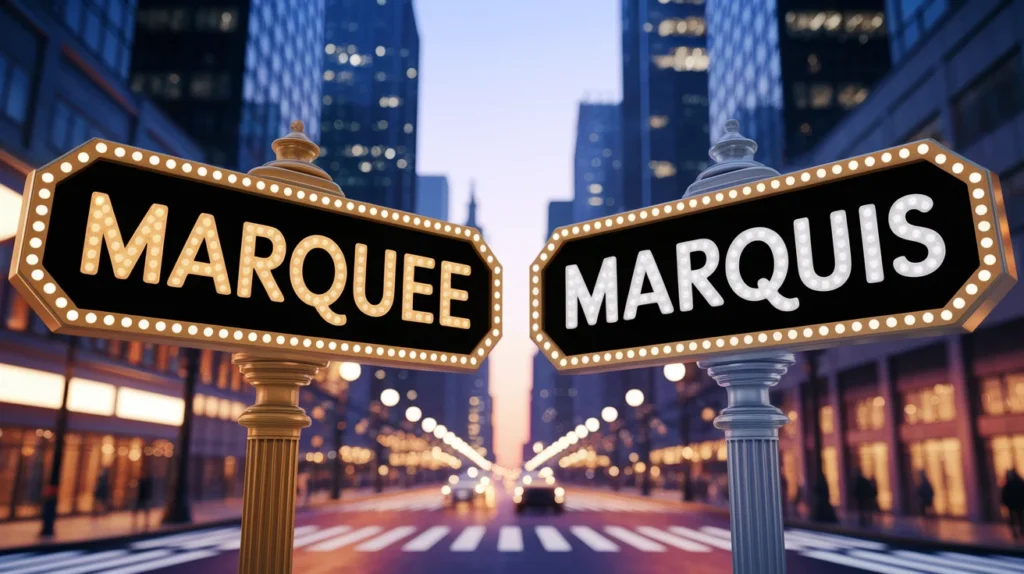In the world of the English language, homophones can often lead to confusion, and one of the most commonly mixed-up pairs is “marquee” and “marquis.” These two words are pronounced similarly, but they have vastly different meanings, spellings, and uses in the English language. If you’re someone who has stumbled over these words in your writing or speech, you’re not alone.
However, understanding the key differences between these terms will help you use them correctly, and can greatly improve your writing and communication skills.
This guide will provide you with expert insights into spelling, definitions, origins, and practical examples of when and how to use both terms in real-world situations.
By the end of this article, you’ll have a clear understanding of how to distinguish between marquee and marquis, and how to avoid common mistakes that even seasoned writers make. The focus will be on practical application while upholding the highest standards of trustworthiness and authoritativeness. Let’s dive in!
What Are Homophones? Why Does It Matter?
To start, let’s first break down the concept of homophones. Homophones are words that sound the same but have different meanings and spellings. Marquee and marquis are perfect examples of homophones, which can confuse even experienced speakers or writers. In fact, confusing them can undermine your credibility in professional or academic writing.
Why Is It Important to Understand Homophones?
When writing, especially in professional or academic settings, using the wrong homophone can impact your credibility. The experience of your audience is crucial; the clearer and more accurate your language, the more authoritative your writing will appear. Proper homophone use also ensures that the message you are communicating is trustworthy and understandable.
Marquee: Definition, Meaning, and Usage
The word marquee is most commonly associated with large tents, canopies, or structures, particularly those used for outdoor events like weddings, parties, or concerts. The term is also used to describe the prominent sign above a theater or stadium that displays information like movie titles or the names of performers.
Primary Meaning of Marquee
- Event Structures: A marquee is a large tent or structure, often used at festivals, outdoor weddings, or other public events. These structures provide shelter for people in outdoor settings.
Example: “The wedding was held in a beautiful marquee in the garden, offering protection from the rain.” - Theater Signage: In a more modern context, a marquee can also refer to the large sign at the front of a movie theater or stadium, where the names of movies or events are displayed in lights.
Example: “The movie title was displayed in bright lights on the theater’s marquee.”
Extended Use: Marquee as a Descriptive Term
In some contexts, the word marquee is used as an adjective to describe something of high importance or prestige, such as a “marquee player” in sports or a “marquee performer” in entertainment.
- Marquee player: A top-billed or prominent figure in a sports team.
Example: “The team’s marquee player led them to victory in the final game.”
Marquis: Definition, Meaning, and Historical Context
Now let’s look at marquis. Unlike marquee, which refers to a structure or sign, marquis is a noble title used in European aristocracy. It ranks below a duke but above an earl or count. This title has historical significance, particularly in European cultures, and is rarely used in modern contexts outside of historical discussions or in the titles of noble families.
Primary Meaning of Marquis
- Noble Title: The title of marquis was historically given to landowners who governed border territories or regions of importance. This title was common in France, England, and Spain.
Example: “The Marquis of Lafayette played a crucial role in the American Revolution.” - Marquis vs. Marquise: There’s also the female counterpart to the marquis, known as a marquise. The marquis is typically male, while the marquise is the wife or female counterpart of a marquis. For example, “Marquis de Sade” is a famous historical figure, while “Marquise de Pompadour” was a notable historical female counterpart.
Etymology: The Origins of Marquee and Marquis
Understanding the etymology of both words helps clarify their meanings and usage. Both marquee and marquis derive from French, but their historical roots and evolution into modern English are different.
- Marquee comes from the French word “marquise”, meaning a canopy or awning. This word was borrowed into English to refer to the covering or shelter used in events and entertainment settings.
- Marquis, on the other hand, comes from the Old French “marchis”, derived from the Latin “marca”, meaning border or boundary. The title was originally used for those who governed border territories between kingdoms.
How to Use Marquee and Marquis Correctly: A Quick Guide
1. Marquee – A Physical Structure or Event Sign
Use marquee when referring to an event structure or sign, such as a tent for outdoor events or the prominent sign above a theater.
- Example: “They put up a marquee for the wedding reception.”
2. Marquis – A Noble Title or Rank
Use marquis when referring to a nobleman of European aristocracy, particularly those who governed border territories.
- Example: “The Marquis de Montrose was an important figure during the Scottish Civil War.”
Common Mistakes and Misunderstandings
Despite the clear distinction, people often mix up marquee and marquis because of their similar pronunciation. The most common mistake is using marquis when referring to an event structure or sign, which should always be marquee.
Examples of Misuse
- Incorrect: “The marquis outside the theater was glowing with lights.”
- Correct: “The marquee outside the theater was glowing with lights.”
This mistake can confuse readers or listeners and reduce the professionalism of your writing or speech.
Tips for Remembering the Difference
- Marquee: Think of events or structures you can see — a tent or a theater sign.
- Marquis: Think of titles and noble ranks. If it involves royalty or aristocracy, it’s most likely marquis.
To help cement the difference, visualize these two words in separate contexts. Imagine a marquee at a wedding, then imagine a marquis in a historical setting like a royal court.
Why It’s Crucial to Get It Right
As mentioned, using the wrong word can damage your credibility, especially in professional or academic writing. Getting your words right helps you come across as more authoritative and trustworthy in your field. Plus, it reflects a strong command of the language.
Imagine you are reading a professional blog post about aristocratic history, and you see the term “marquee” used to describe a nobleman. This would immediately undermine the authority of the article and cause confusion.
Recap: Marquee vs. Marquis – A Simple Comparison
Let’s wrap things up with a quick comparison:
| Word | Meaning | Used In | Pronunciation |
| Marquee | A large event structure or theater sign | Events, movie theaters, sports | /mɑːˈkiː/ |
| Marquis | A noble title, ranking below a duke | Historical, aristocratic titles | /ˈmɑːrkwɪs/ |
By now, you should have a firm grasp of the differences between marquee and marquis. With this newfound knowledge, you’ll be able to use both words confidently and accurately in your writing and speech.
FAQs: Marquee vs. Marquis
Q1: Are marquee and marquis pronounced the same?
Yes, in most accents, “marquee” and “marquis” are pronounced similarly as /mɑːrˈkiː/. However, some British pronunciations of “marquis” sound like /ˈmɑːkwɪs/. Despite their similar sounds, they have very different meanings.
Q2: What is the main difference between marquee and marquis?
- Marquee refers to a large tent or a sign above a theater or stadium.
- Marquis is a noble title, historically used in European aristocracy.
They are homophones, but their meanings and uses are entirely unrelated.
Q3: Can “marquee” be used to describe a person?
Yes, in modern English, “marquee” is often used as an adjective to describe a person of major importance, especially in sports or entertainment.
Example: “She’s a marquee performer at the music festival.”
Q4: Is “marquis” still used today?
Yes, although it’s rare. “Marquis” still exists in some European noble titles, particularly in France and the UK, but its usage is mostly historical or ceremonial.
Q5: What is the feminine form of “marquis”?
The feminine form of “marquis” is “marquise.” It refers to a woman holding the rank in her own right or the wife of a marquis.
Conclusion
Understanding and using marquee and marquis correctly is a small but significant step toward effective communication. It reflects professionalism, shows attention to detail, and boosts your credibility. Whether you’re writing a blog post, academic paper, or simply engaging in casual conversation, being precise with your words ensures that your audience will take you seriously.
Keep this guide handy for when you encounter these tricky words, and feel free to revisit it anytime you need a refresher on marquee vs. marquis. Happy writing!

Alex Starc, the author behind angelnumbering.com, is passionate about uncovering the spiritual and mystical meanings of angel numbers. With a deep interest in numerology and symbolism, Alex has dedicated his writing to helping readers understand the hidden messages behind numbers and their significance in everyday life.



